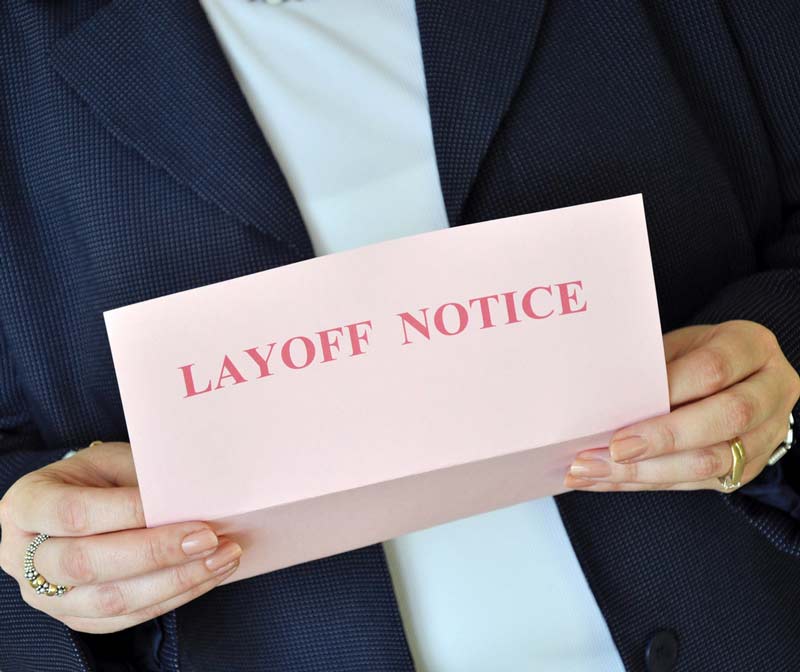Getting a pink slip might not be as devastating as learning you have a serious medical problem, but the trauma of losing a job can hit hard, especially for those who aren’t ready financially.
More than three-quarters of the nation’s workers live paycheck to paycheck, a condition that makes job loss not just demoralizing but terrifying. Worse, they have consumer debt the demands monthly payments and they are immediately swamped when their income vanishes.
People buy medical insurance to safeguard their health but far fewer fund bank accounts as a hedge against unemployment. If you lose a job, that obviously becomes even more difficult so prepare in advance with these steps:
- Keep pace with payments due every month like rent, utilities and especially credit cards
- Start or resume contributions to an emergency fund that can tide you over at least three months
- Downsize your lifestyle
- Cut or eliminate discretionary spending
- Create a budget, if you don’t already have one
- Stay current with technology so you have the flexibility to change jobs
Most Workers Live Paycheck-to-Paycheck
Unfortunately, a shocking number of Americans are woefully ill-equipped to handle job loss, usually because they lack a financial plan that would allow them to weather setbacks.
A 2017 CareerBuilder survey found that 78% of American workers live paycheck to paycheck, up 3 percentage points from 2016. Despite and improving job market, workers are struggling with debt. A quarter of workers say they were unable to make ends meet every month in the year prior to the survey, and 71% said they were in debt, up from 68% a year earlier. Nearly half say that though they are managing their debts, 56% say they feel like they are always in debt.
The national debt problem is so severe that nearly a fifth of workers are cutting back on contributions to their retirement plans or savings accounts to make ends meet. This comes at a time when credit card debt reached an all-time high of more than $1 trillion.
» Learn More: Living on One Income
Plan for the Unexpected
So what’s an employee to do? For those with credit card debt and no savings, the immediate goal is to pay down debt and build a modicum of cash reserve. Debt should get the top priority, since the interest paid on credit card balances can easily top 20% annually. If the balance on your savings account is small, divert any income you don’t need for food, rent or mortgage payments, student loans and essentials toward increased monthly credit card payments.
If you can’t manage this on your own, consider seeking advice from a nonprofit credit counselor. They offer free advice on budgeting and suggestions on how to regain control of your finances.
When you get your revolving debts under control, and hopefully paid off, turn to building an emergency fund. A bank account is a frontline defense whether you have a job or lose one. Most financial planners recommend a six-month reserve, which should be kept in a separate account or money market fund. The money needs to be quickly accessible when an emergency arises.
Think of your emergency fund as self-insurance. You should contribute to it and not touch it, as tempting as that might be. Yet even though you have a cushion against calamity, you should also be prepared to alter your lifestyle if you’re suddenly out of work.
Though the economy is growing, jobs routinely disappear. Technological change is a key driver of job loss as positions are automated and online commerce changes the way we buy and sell things. Bricks and mortar retail is one of the hardest hit areas now, with big-box and department stores closing as companies reposition their businesses.
In January 2018, for instance, Wal-Mart announced it would close 63 of its Sam’s Club wholesale outlets, converting as many as 12 to e-commerce locations. Other retailers including Sears, Macys and JCPenney have also closed stores, and across the country largely empty shopping malls give evidence to commercial change.
The good news is that the economy is much stronger now than a decade ago when the Great Recession lay waste to thousands of jobs. The nationwide unemployment rate fell to 4.1% nationally in January 2018, a level economists call full employment. Some states had even lower rates and three – Hawaii, Mississippi and California – reported the lowest jobless rates since records began in 1976.
That means that if you’re out of work, you’ll probably be able to find another job quickly. But the abundance of jobs doesn’t mean you’ll find one suited to you right away, so you should still prepare for a job search the might take a while. If you lose your job, it’s time to downshift your spending until you find your next gig.
Steps You Need to Take
Don’t count on unemployment insurance to cover all your expenses. Though you should immediately a claim when you lose your job, you might be shocked to learn how little you’ll receive. Each state operates its own program, and some or more generous than others, but none are designed to replace your wages fully, and most limit payments to six months.
Unless you have investment income (most of us don’t) or a generous relative, you’ll need to trim expenses while looking for work. Preserving cash is the key. This isn’t the time to pay down your credit card debts. Make the minimum payments for now and return to paying them off when you have a job. The same holds for other debt reduction, like extra mortgage payments.
You should also contact your creditors and explain your predicament. It might be possible to get a temporary payment deferral which will allow you to keep cash for immediate needs. Many creditors will refuse your request but asking is worth it if it improves your short-term cash flow.
Next, cut way back on discretionary spending. Stop eating out, cut out cable television, reduce your alcohol consumption, don’t buy gifts, skip movies and concerts, and confine your driving to essential trips.
If you weren’t good at budgeting before the layoff, now’s the time to hone your skills. The CareerBuilder survey found that just a third of workers stick to a budget, which helps explain their debt problems. But when you’re jobless, budgeting is critical. List for income and expenses and prioritize the expenses. Before spend money, consult the monthly limits set in your budget. And, if you have a hard time restraining your credit card use, consider switching to cash until you find a new job.
Budgeting and restraint should see you through the hiatus between jobs. And there’s a fringe benefit: If managing joblessness teaches you to budget, you might find you become a better money manager in the future.

6 MINUTE READ
Home » InCharge Blog »
Sources:
- NA, (2017, August 24) Living Paycheck Is a Way of Life for Majority of U.S. Workers. Retrieved from: http://press.careerbuilder.com/2017-08-24-Living-Paycheck-to-Paycheck-is-a-Way-of-Life-for-Majority-of-U-S-Workers-According-to-New-CareerBuilder-Survey
- Singletary, M. (2018, January 16) Think You Might Lose Your Income? Four Money Moves to Make Now. Retrieved from: https://www.washingtonpost.com/news/get-there/wp/2018/01/16/think-you-might-lose-your-income-four-money-moves-to-make-now/?utm_term=.4499c4a01fc5

















